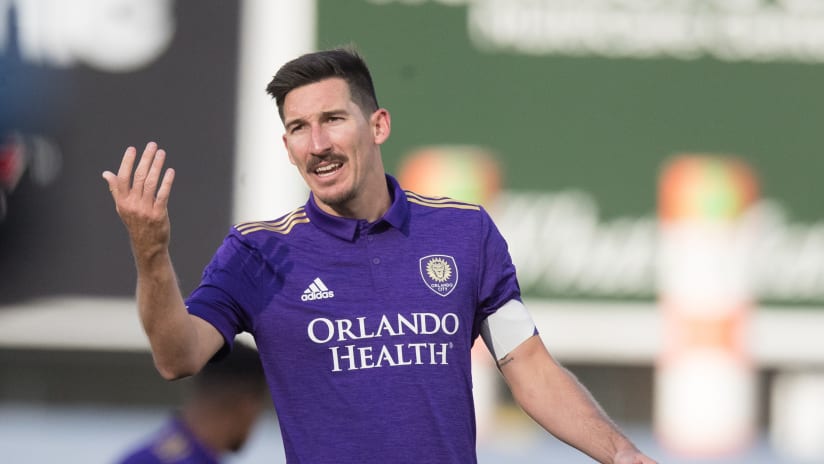Three seasons have passed in a flash for Orlando City SC, perhaps because there has always been something about the club that was new. The team, itself, and Kaka in year one. New coach in year two. New venue in year three. Ever since they jumped to Major League Soccer, the Lions have felt new.
Unfortunately for Orlando, they aren’t new anymore. They’re now in year four, and comparing their progress against a couple of benchmarks shows a franchise that’s behind schedule.
In each of its seasons, Orlando’s record has gotten worse, going from 44 points in their expansion season to 41 in 2016, then 39 last year. Their place in the broader MLS standings has also steadily regressed, from 14th to 15th, then 18th, and last year, the Lions posted franchise worsts in points (39) and goal difference (minus-14).
Portland fans are familiar with these struggles, having endured their own team’s transition into MLS seven years ago. There, too, was a franchise that decided to change coach in its second season, attempting to shift course. But whereas the Timbers eventually made the playoffs in their third season, finishing atop the Western Conference in the process, Orlando has continued to slide since replacing Adrian Heath with Jason Kreis.
The more relevant comparison, in terms of teams, is probably New York City FC, the team Orlando entered MLS with four seasons ago. NYCFC finished worse than Orlando in its inaugural campaign, placing 17th in the overall standings, but has made the playoffs in each of the last two seasons. Now, one month into their fourth campaign, the Pigeons sit top of the league, and while that status could very well change as the year matures, the contrast with Orlando is striking.
Despite some major acquisitions this offseason, the Lions are off to a slow start. Through four games, Orlando only has four points, and while that’s two more than the Timbers team that visits on Sunday, it’s still cause for concern. Despite playing three of their matches in the imposing Orlando City Stadium, the Lions have only claimed one win. In the process, they’ve conceded eight times and posted a minus-two goal difference.
This is not what the team imagined when they landed Justin Meram from Columbus. The Iraq international has been excellent in his forward’s role, but he hasn’t been enough. The absences of two other recent acquisitions -- former Red Bulls creator Sacha Kljestan, who missed the team’s first two games, and former Sporting KC striker Dom Dwyer, who only returned last week -- could been seen as an explanation, but scoring goals has not the team’s problem. It’s everything behind Orlando’s new attack that should cause concern.
Player |
Games |
Minutes |
Goals |
Assists |
Shots |
Passing % |
|---|---|---|---|---|---|---|
Dwyer, Dominic (SKC/ORL) |
33 |
2823 |
16 |
2 |
85 |
65.84 |
Kljestan, Sacha (NYRB) |
32 |
2624 |
6 |
16 |
31 |
74.84 |
Meram, Justin (CLB) |
33 |
2604 |
5 |
10 |
57 |
72.44 |
Kreis continues to try and install the diamond midfield he used to much success at Real Salt Lake, but the foundation of that midfield, newly acquired defensive midfielder Oriol Rosell, has been sidelined with a knee problem. In players like Cristian Higuita, Yoshi Yotún and Josué Colman, the depth chart has talent, but it’s unclear how they all fit into Kreis’ preferred system. That lack of fit, as well as the team’s unfamiliarity with the approach, means former Portland captain Will Johnson may continue to play a prominent role, but as Orlando did this weekend, when they briefly switched to a 4-2-3-1 formation, they may need to develop a second approach.
At the back, there are fewer personnel questions, but the problem may be more worrisome. Ostensibly, the team has a pair of quality fullbacks (Scott Sutter, Mohamed El-Munir), good center backs (Jonathan Spector, Amro Tarek) and a goalkeeper that earned a U.S. Men's National Team look last season (former Timbers player Joe Bendik). When healthy, the quintet could form a formidable rearguard, but with Spector having battled concussion symptoms and Tarek going down last weekend, it’s unclear with Kreis’ first choices will all be in the lineup. And until they are, we can’t be sure the back five will work.
Within all these problems, though, there is at least a vision for a successful approach. If the defense plays to its talent, the goals against should stop, provided the midfield can provide some support. With the presences of Kreis and Johnson, Orlando has two minds who know what the diamond can so. The quality of talent, in the middle, is not a problem. Speeding up the learning curve will be the greater issue.
The context for this, however, are two words those around Orlando may grow to abhor: Year Four. When they come into the league, Orlando was supposed to hit the ground running, with their fan base and Kaka projecting a franchise that was ahead of the curve. Three years later, though, the team has yet to taste the postseason, and amid a myriad changes on and off the field, it’s uncertain whether the combinations are right in Year Four.
Those combinations have 30 more games to find solutions. Perhaps, six months from now, Orlando will have finally found its course. They certainly have the talent to do so.













